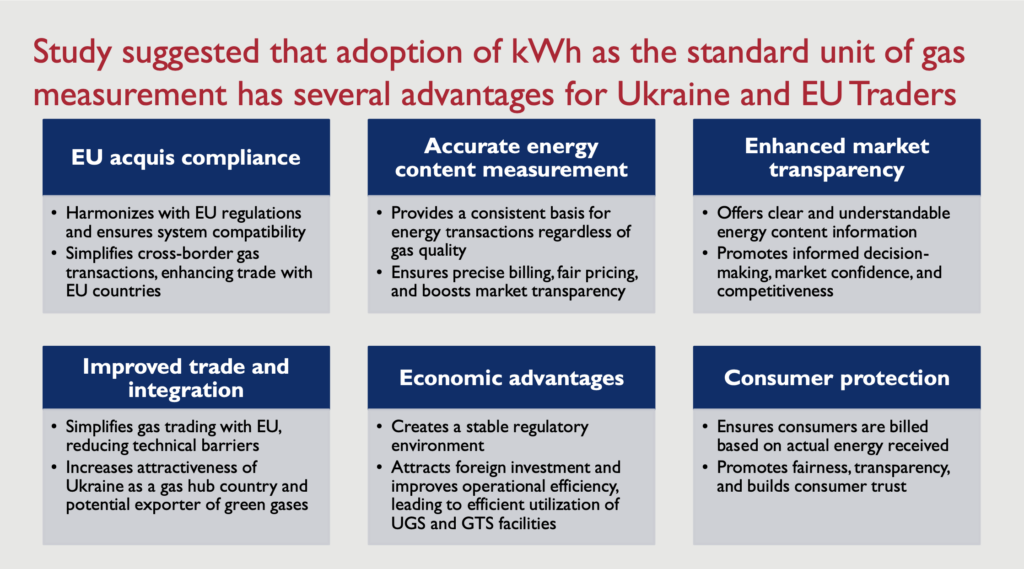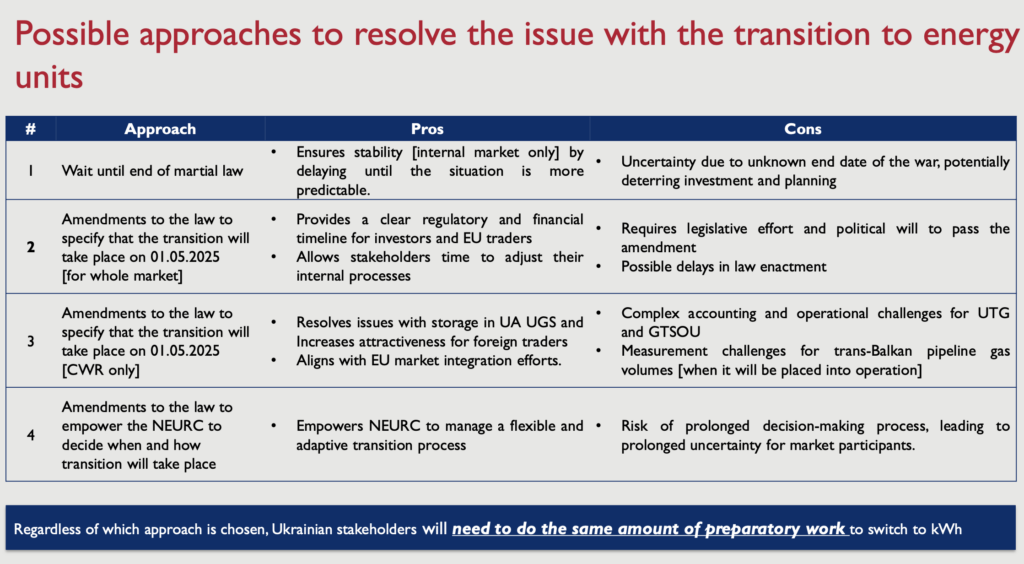On September 11, 2024, the USAID Energy Security Project (ESP) brought together key decision-makers from Ukraine’s gas sector and stakeholders from the European Union to discuss the conversion of energy units from cubic meters (m3) to kilowatts-hours (kWh) for natural gas. Per the Association Agreement with the EU, Ukraine is to align its energy legislation with the relevant natural gas framework of the European Energy Community. The transition from cubic meters to kilowatts-hours will foster further integration of the Ukrainian gas market with the single European energy market, simplify gas trade and storage operations with European traders, and strengthen Ukraine’s energy security.
Opening the event, Kathleen Kirsch, Deputy Director, Office of Critical Infrastructure, USAID/Ukraine, underlined the importance of Ukraine’s energy sector changes, particularly in moving toward more efficient and transparent energy management practices. “A key development in this area is the advancement of legislation to convert energy units for natural gas from cubic meters to kilowatt-hours. This shift represents an effort to modernize energy measurement and billing systems and improve energy efficiency,” stated Mrs. Kirsch.
The representatives of the Ministry of Energy of Ukraine, Ukraine’s Parliamentary Committee on Energy, Housing and Communal Services, Energy Community Secretariat, the National Energy and Utilities Regulatory Commission of Ukraine, Naftogaz of Ukraine, Ukrtransgaz, UkrGasVudobuvannya, Gas Distribution Networks of Ukraine, Gas Transmission System Operator of Ukraine, European Federation of Energy Traders, and other interested stakeholders gathered to discuss further steps Ukraine can make to transit to energy units.
Deputy Minister of Energy Mykola Kolisnyk stressed, “Transition to energy units is one of the key milestones towards integrating Ukraine’s gas market with the European one. Although Ukrainian stakeholders are making significant progress in aligning the national legislation with the EU directives and acts on metering natural gas in energy units, a clear and comprehensive road map will foster the process, keeping in mind how the whole transition process will influence the end users of the natural gas.”
Member of Parliament Andrii Zhupanyn, Chairman of the Subcommittee on Natural Gas Development of Ukraine’s Parliamentary Committee on Energy, Housing and Communal Services, emphasized, “Although the legal framework is already in place, the implementation has been postponed. Ukraine has to continue its efforts on transitioning to energy units and further reforming its gas sector despite the war, advancing the country’s integration with European energy markets and developing gas policies and regulations per standard European rules.”
Representatives of the Energy Community Secretariat, Head of the Gas Unit , Predrag Grujicic, and Senior Gas Expert, Carolina Cegir, attracted the participants‘ attention to the recently published Secretariat’s Market Observatory note “Status of implementation of energy units for natural gas metering and settlement.” They underlined that “The transitioning towards the energy units reflects Ukraine’s efforts to modernize energy measurement and billing systems, enhance energy efficiency, and align with the Energy Community acquis and European standards and practices. The current approach to natural gas metering in cubic meters is considered an obstacle for further natural gas market development, particularly when it comes to gas storage and renewable gases, as well as energy efficiency measures.” The Secretariat recommended introducing energy units in practice as one of the short-term actions to improve Ukraine’s natural gas market compliance with the Energy Community acquis.”
As the USAID Energy Security Project is helping to facilitate the transition from measuring natural gas in cubic meters to kilowatt-hours, ESP’s Gas Sector Lead Justin Goonesinghe presented the advantages, approaches to resolve the issues, regulatory perspectives, and ways to move forward. “The conversion of energy units from cubic meters to kilowatts-hours for natural gas will facilitate further integration of Ukraine’s gas market with the gas markets of EU and increase the attractiveness of the country’s gas sector to international gas traders and investors. If Ukraine aspires to become an Eastern European gas hub, energy units should be adopted in the near future,” said Mr. Goonesinghe.

In 2022, the Government of Ukraine postponed the adoption of energy units because of the difficulties in gas sampling on each gas route, as well as the complicated coordination between executive authorities. This made it challenging to ensure timely and effective implementation of changes to secondary legislation required for the transition to energy units.
As of September 2024, the situation has improved. Operators are now able to measure the caloric value on each gas route so the data can be available to other market participants. The coordinated interaction between authorities ensures the legislative work is going on, and a communication campaign can be launched to inform households and businesses about the transition to kWh once all legal and practical implementation aspects are clear.

An in-depth follow-up discussion brought together experts who collectively agreed on the need to convert energy measurements for natural gas from cubic meters to kilowatt-hours. The industry is largely prepared for this transition, with many steps already taken. Both Ukrainian and European stakeholders agreed that the transition will facilitate the modernization of Ukraine’s energy measurement and billing systems, improve natural gas market compliance, enhance energy efficiency, and align with the Energy Community acquis and European standards and practices.
More information on USAID ESP’s vision of advantages, approaches to resolve the issues, regulatory perspectives, and ways to move forward is available via the link.
